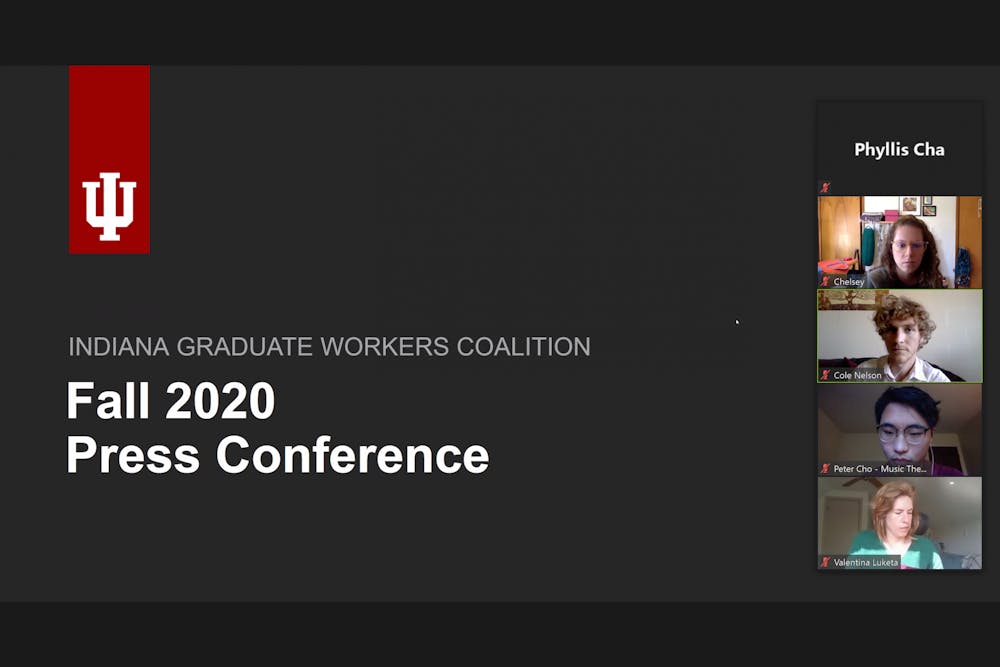More than 45 people attended a virtual press conference at 3 p.m. Saturday organized by the Indiana Graduate Workers Coalition, a multidisciplinary group of graduate workers fighting for better working conditions.
IGWC had four demands for IU. They asked for a living wage, yearly raises to account for inflation, the termination of mandatory fees and giving graduate instructors alternatives to in-person teaching, organizer Peter Cho said.
Last year, the College of Arts and Sciences created a task force and researched the condition of graduate students at IU. Graduate students accessed the report using an open records request through the Freedom of Information Act, and many of their demands are based on information from the internal report.
The report stated that graduate stipends put students at grave financial risk, placing them close to the 2019 poverty line. Mandatory fees paid by graduate students, and the additional ones paid by international students, reduce their wages even further, according to the report. The report said IU’s stipend for graduate students is lower compared to other Big Ten universities.
The report acknowledged that graduate students are known to sell their plasma to make ends meet, which the report called entrepreneurial activities, organizer Cole Nelson said.
“So, we as graduate workers are also entrepreneurs when we sell our plasma to stay alive,” Nelson said.
Nelson said the lowest annual salary in the College of Arts and Sciences, one which is typical for graduate students, is $13,580 after fees. This falls $7,257 short of IU’s own calculated cost of living in Monroe County. Nelson said graduate students in Jacobs School of Music receive even less money, with stipends that are just over $4,000 annually after fees.
IU’s student central page estimates the cost of attendance for a full-time graduate worker to be $21,772.
“What this amounts to is IU’s own admission that next to none of its graduate workers make a living wage, by their own definition,” said Nathan Schmidt, a graduate student and one of the organizers.
Nelson said the recommendation the report makes, such as increasing stipends to the poverty line rather than the cost of living, are modest. He also said the university has shown no signs of fulfilling those recommendations.
“It seems there’s actually more of a backslide away from trying to make good on these recommendations than putting forward strides to implement them,” Nelson said.
Many graduate students, upon protest, have been told from the university’s administration and supervisors in their departments that now is not the time to ask for money from IU due to budget constraints resulting from the COVID-19 pandemic.
“First, there is only one name for an institution that is run in such a way that it cannot afford to pay its employees a living wage,” Schmidt said. “Fiscally irresponsible.”
The graduate students also asserted that IU is not financially struggling, citing IU’s Bicentennial fundraising campaign that brought in $3.9 billion. On Aug. 13, the university announced it had reached more than $1 billion in external research awards and private philanthropy funding, and funding from the Cares Act gave IU-Bloomington $24.5 million, Schmidt said.
Schmidt said IU also met its enrollment target for this year, despite concerns of reduced enrollment, which brings in additional tuition and fees.
The IGWC campaign requests $7.8 million to be allocated towards stipends. If all of IGWC’s requests were met, IU would be spending less than 4% of its budget on the entirety of the graduate workforce, Schmidt said.
Another concern is mandatory fees, which graduate students are required to pay. This year, Nelson said they aren’t itemized, meaning students do not know what the money is being used for. In recent years, the fees for international students have risen without explanation from the university, he said.
“For the university to deny its most vulnerable employees a living wage during a pandemic would be an egregious affront to our rights and our labor, bordering on the inhumane,” Schmidt said.




